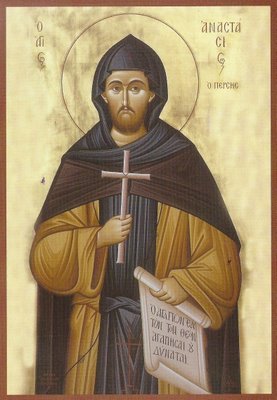Saint Anastasios the Persian
22 Ιανουαρίου 2023
Saint Anastasios was born in the village of Rachiz in Persia, which was situated at the province of Rasnouni.He lived during the 7th century AD, during time of the Persian king Chosroes the Second (590-628 AD), and the Emperor of Byzantium, Irakleios. His name was Magundat and came from the class of the Magoi (Zoroastrian priests), as he was the son of magus Mav. He had a good education and had great interest in philosophical and religious thought.
He served in the army of king Chosroes, who came to Jerusalem and transfered the Holy Cross to Persia (614 AD). The educated Persians were interested in the very person of Christ and His religion. One of them was Magundat, and after having learned from a faithful Christian that with the death of Christ on the Cross, the human race was saved, he believed in Christ and decided to embrace the Christian religion. After participating in the campaign of the Persians against Constantinople, he found himself at the city of Chalkidona. During his stay there, and after he learned that Herakleios had defeated the Persians, he went to Ierapolis and thence to Jerusalem, where he was baptized by Patriarch Modestos, to whom he was introduced by the priest of the church of the Resurrection, and took the name Anastasios. Following his baptism he was tonsured as a monk at the Monastery of Saint Ioustinos or as others write at the Monastery of Saint Savvas. After seven years after living as a monk, he went to the city of Caesarea in Palestine, where he made it his duty to try to convert into Christianity the Persian garrison stationed there. His effort in converting his countrymen was reported to the governor Marzabanes. When Marzabanes learned that Athanasios was the son of a Magus, he tried everything possible to reintroduce him to the Persian religion-Zoroastrianism. He failed however, and Marzabanes became angry and instructed for him to work carring heavy stones without taking any rest. The torture continued until he was send to Persia, before the king of the Persians Chosroes. Chosroes showed all his meanness to the Saint, subjecting him to endless martyrdom. Seeing that there was no case in renouncing his faith, the King instructed for Athanasios to be executed. He was beaten mercilessly with sticks until near death. The torture took place daily. At the end he was hung since the King ordered for him to die by hanging. But as he was suffocated, just as he was ready to die, he was let go in order for him to witness that he would be decapitated. Anastasios smiled happily not only because he became able to believe, but to also die for Christ. His Martydom took place near the Euphrates, at a city-fortress called Barsaloe on the 22d of January 628 AD, along with 70 other Christians and martyrs, and for this reason, our Orthodox Church celebrates the memory of Saint Anastasios the Persian, every 22d of January. Before the Christians went to get his body from the place of execution, a group of wild dogs gathered together and started eating the bodies of the murdered Christians. These dogs not only did hurt the body of the Saint, but also protected it. His body was carried by Christians from Persia to Palestine, were he was buried in the Monastery of Saint Sergius, but later his holy relic was moved to Constantinople, and finally to Rome by the crusaders who sacked Constantinople in 1204.
Source: http://noctoc-noctoc.blogspot.com/2009/02/saint-anastasios-persian.html






